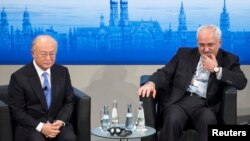Iran is taking further action to comply with an interim nuclear agreement with six world powers, a monthly U.N. atomic agency report showed, a finding the West may see as positive ahead of a November deadline for clinching a long-term deal.
The report by the International Atomic Energy Agency (IAEA), seen by Reuters, made clear that Iran is meeting its commitments under the temporary deal, as it and major powers seek to negotiate a final settlement of a decade-old nuclear dispute.
It said Iran had diluted more than 4,100 kg of uranium enriched to a fissile concentration of up to 2 percent down to the level of natural uranium. This was one of the additional steps Iran agreed to undertake when the six-month accord that took effect early this year was extended by four months in July.
Refined uranium can be used to fuel nuclear power plants, Iran's declared goal, but can also provide the fissile core of a nuclear bomb if processed to a much higher degree, which Western states fear may be the country's ultimate aim.
The IAEA is tasked with checking that Iran is living up to its part of the interim agreement, which was designed to buy time for the current talks on a comprehensive solution of the stand-off that would dispel fears of a new Middle East war.
Iran denies Western allegations that it has been working to develop a capability to make atomic bombs.
After years of escalating tensions between Iran and the West, the election in mid-2013 of Hassan Rouhani as Iranian president on a platform of ending Tehran's international isolation created new room for diplomacy that ultimately led to last year's breakthrough nuclear deal.
But it remains unclear whether Iran and the six states will meet a self-imposed November 24 deadline for hammering out a longer-lasting deal to scale back Tehran's atomic activities in exchange for a phasing-out of crippling economic sanctions.
The initial aim was for Iran and the United States, France, Germany, China, Russia and Germany to clinch the agreement in July. But the talks were extended in view of persistently wide differences over the future size of Iran's enrichment program.
Under the preliminary accord, Iran halted its most contested nuclear work -- enrichment of uranium to a higher fissile concentration of 20 percent -- in exchange for a limited easing of sanctions that are hurting its oil-dependent economy. It also converted its stockpile of the material into oxide from gas.
Over the four months of the deal's extension, Iran is to receive $2.8 billion in previously frozen oil revenue held in banks abroad, in addition to the $4.2 billion it got earlier.
In exchange, it agreed to take some additional nuclear steps, including making nuclear fuel for a research reactor and diluting a large amount of low-enriched uranium. Apart from the dilution, Monday's IAEA report said Iran since July had used 17.1 kg of 20 percent uranium in oxide form to manufacture fuel.





